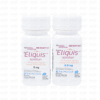The 2x Referral Bonus Event Is Now On! More Info ➡️
Home » Medication » Eliquis (Apixaban)
SAVE 10% OFF First Order With Coupon Code: WELCOME10

Our Price: $159.00

Eliquis (apixaban) is an anticoagulant medication that helps prevent blood clots from forming as well as aids existing blood clots.
Buy apixaban online and save even $400 on your order!
Step 1
Place Your Prescribed Eliquis Dosage In Your Cart
Step 2
Complete Checkout
Step 3
Upload Your Eliquis Prescription
(Shipping takes approximately 4-10 business days. A tracking number will be provided)
Eliquis belongs to a class of drugs known as direct oral anticoagulants (DOACs). It’s used to reduce the risk of blood clots and stroke in people diagnosed with atrial fibrillation (an irregular heartbeat).
It also treats and prevents blood clots in the legs (deep vein thrombosis or DVT) and lungs (pulmonary embolism or PE).
The active ingredient in Eliquis is apixaban. Apixaban works by inhibiting Factor Xa. By blocking Factor Xa, it reduces the blood’s ability to clot, thus lowering the risk of harmful blood clots forming.
One of the most significant applications of Eliquis is in patients diagnosed with atrial fibrillation (AFib). AFib is a heart rhythm disorder characterized by irregular and rapid heartbeats, which can lead to the formation of blood clots in the heart. Eliquis is prescribed to AFib patients to lower the risk of stroke and systemic embolism.
Deep Vein Thrombosis (DVT) occurs when a blood clot forms in one of the deep veins of the body, typically in the legs. If left untreated, the clot can break loose and travel to the lungs, causing a potentially life-threatening condition known as pulmonary embolism. Eliquis is effective in treating DVT and preventing its recurrence.
Pulmonary embolism is a condition where a blood clot, usually from a DVT, travels to the lungs, leading to breathing difficulties and other severe complications. Eliquis is used to treat existing pulmonary embolisms and to prevent the development of new ones.
To understand how Eliquis (apixaban) works, it’s essential to delve into the coagulation cascade, the complex process by which blood clots form.
The coagulation cascade is a series of chemical reactions involving various proteins called clotting factors. These factors work together in a sequence to produce a blood clot.
Factor Xa is a crucial enzyme in this cascade. It plays a pivotal role in converting prothrombin into thrombin
Apixaban is a direct and selective inhibitor of Factor Xa. This means it directly targets and blocks the activity of Factor Xa, which in consequence, reduces the production of thrombin, decreases the formation of fibrin, and ultimately, prevents the formation of blood clots.
If you have any questions whatsoever about the administration of Eliquis, talk to your doctor.
The dosage of Eliquis depends on the medical condition being treated, as well as individual factors such as age, weight, and kidney function.
Dosing Considerations for Renal Impairment
Patients with moderate to severe renal impairment may require dosage adjustments, as the kidneys play a role in eliminating Eliquis from the body. Your healthcare provider will determine the appropriate dosage based on your kidney function.
It is essential to use Eliquis with caution and be aware of the potential warnings and precautions. Patients must follow the prescribed dosage and stay vigilant for any signs of bleeding or adverse reactions.
Here are some critical warnings and precautions to keep in mind when using Eliquis:
Regularly attend follow-up appointments with your healthcare provider to monitor your condition and check for any adverse effects. Be vigilant about any unusual symptoms and report them promptly.
Mild Side Effects:
Serious Side Effects (Require Immediate Medical Attention):
Uncontrolled or severe bleeding (vomiting blood, black/tarry stools, coughing up blood)
Severe allergic reactions (skin rash, itching, swelling of the face/throat, severe dizziness, difficulty breathing)
Dark urine (a potential sign of liver problems)
Any bleeding that is prolonged or heavy.
What medications can come into interaction with apixaban? On this list, we can find:
This is not an exhaustive list. Always consult with your doctor about any medications, supplements, vitamins, and substances you’re taking or planning to take while being treated with Eliquis.
You can be confident in the safety and authenticity of our Eliquis, sourced from licensed Canadian pharmacies and meeting all federal standards. This Health Canada-approved medication is identical to US versions, with only packaging differences. Order online or by phone for discounted prices and direct shipping.
Find Affordable Eliquis for Sale at Insulin Outlet
